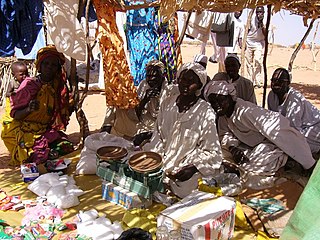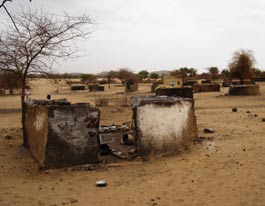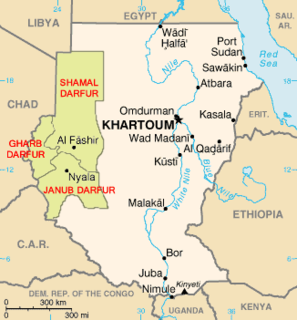Related Research Articles
The Peace and Security Council (PSC) is the organ of the African Union in charge of enforcing union decisions. It is patterned somewhat after the United Nations Security Council. The PSC is also the main pillar of the African Peace and Security Architecture (APSA), and works with other pillars of the APSA in order to promote "peace, security and stability in Africa". The specific goal of the Peace and Security Council (PSC) is the "prevention, management and resolution of conflicts". To achieve these goals, it involves subsidiary organizations such as the Military Staff Committee and the Committee of Experts.

The African Union Mission in Sudan (AMIS) was an African Union (AU) peacekeeping force operating primarily in the country's western region of Darfur to perform peacekeeping operations related to the Darfur conflict. It was founded in 2004, with a force of 150 troops. By mid-2005, its numbers were increased to about 7,000. Under United Nations Security Council Resolution 1564, AMIS was to "closely and continuously liaise and coordinate ... at all levels" its work with the United Nations Mission in Sudan (UNMIS). AMIS was the only external military force in Sudan's Darfur region until UNAMID was established. It was not able to effectively contain the violence in Darfur. A more sizable, better equipped UN peacekeeping force was originally proposed for September 2006, but due to Sudanese government opposition, it was not implemented at that time. AMIS' mandate was extended repeatedly throughout 2006, while the situation in Darfur continued to escalate, until AMIS was replaced by UNAMID on December 31, 2007.

United Nations Security Council Resolution 1706, adopted on August 31, 2006, after recalling previous resolutions on the situation in Sudan, including resolutions 1556 (2004), 1564 (2005), 1574 (2004), 1590 (2004), 1591 (2005), 1593 (2004), 1663 (2006), 1665 (2006) and 1679 (2006), the Council expanded the mandate of the United Nations Mission in the Sudan (UNMIS) to include deployments in Darfur to enforce the Darfur Peace Agreement.

United Nations Security Council Resolution 1593, adopted on 31 March 2005, after receiving a report by the International Commission of Inquiry on Darfur, the Council referred the situation in the Darfur region of Sudan to the International Criminal Court (ICC) and required Sudan to co-operate fully. It marked the first time the Council had referred a situation to the Court, and also compelled a country to co-operate with it.

The African Union-United Nations Hybrid Operation in Darfur is a joint African Union (AU) and United Nations (UN) peacekeeping mission formally approved by United Nations Security Council Resolution 1769 on 31 July 2007, to bring stability to the war-torn Darfur region of Sudan while peace talks on a final settlement continue.

United Nations Security Council Resolution 1769, adopted unanimously on July 31, 2007, after reaffirming all resolutions on the situation in Sudan, the Council established the joint African Union – United Nations Hybrid Operation in Darfur (UNAMID) in an attempt to end the violence in Darfur, for an initial period of twelve months.

The United Nations Mission in the Central African Republic and Chad (MINURCAT) was a United Nations peacekeeping mission established by the United Nations Security Council on September 25, 2007 to provide a multidimensional presence of up to 350 police and military personnel to eastern Chad and north-eastern Central African Republic

United Nations Security Council Resolution 1913, adopted unanimously on March 12, 2010, after recalling resolutions 1769 (2007), 1778 (2007), 1834 (2008) and 1861 (2009), the Council noted that the situation in the region of Darfur, Sudan and Chad and the Central African Republic constituted a threat to international peace and security, and therefore extended the mandate of the United Nations Mission in the Central African Republic and Chad (MINURCAT) for a further two months, until May 15, 2010.
United Nations Security Council Resolution 1922, adopted unanimously on May 12, 2010, after recalling resolutions 1769 (2007), 1778 (2007), 1834 (2008), 1861 (2009) and 1913 (2010), the Council noted that the situation in the region of Darfur in Sudan, Chad and the Central African Republic constituted a threat to international peace and security, and therefore extended the mandate of the United Nations Mission in the Central African Republic and Chad (MINURCAT) for a further two weeks until May 26, 2010, pending further discussions on its future.

United Nations Security Council Resolution 1923 was adopted unanimously on 25 May 2010, after recalling resolutions 1769 (2007), 1778 (2007), 1834 (2008), 1861 (2009), 1913 (2010) and 1922 (2010). The Council extended the mandate of the United Nations Mission in the Central African Republic and Chad (MINURCAT) for a final time until 31 December 2010, with a complete withdrawal by that date.
United Nations Security Council Resolution 1935, adopted unanimously on July 30, 2010, after reaffirming all previous resolutions and statements on the situation in Sudan, the Council extended the mandate of the African Union – United Nations Hybrid Operation in Darfur (UNAMID) for a further 12 months until July 31, 2011 and demanded an end to fighting and attacks on United Nations personnel and civilians.

United Nations Security Council Resolution 1945, adopted on October 14, 2010, after recalling previous resolutions on the situation in Sudan, the Council extended the mandate of an expert panel monitoring an arms embargo and other sanctions on groups that "impede peace in Sudan" until October 19, 2011.

United Nations Security Council resolution 1556, adopted on 30 July 2004, after recalling resolutions 1502 (2003) and 1547 (2004) on the situation in Sudan, the Council demanded that the Sudanese government disarm the Janjaweed militia and bring to justice those who had committed violations of human rights and international humanitarian law in Darfur.

United Nations Security Council Resolution 1714, adopted unanimously on October 6, 2006, after recalling previous resolutions on the situation in Sudan, particularly resolutions 1590 (2005), 1627 (2005), 1653 (2006), 1653 (2006), 1663 (2006), 1679 (2006), 1706 (2006) and 1709 (2006), the Council extended the mandate of the United Nations Mission in Sudan (UNMIS) until April 30, 2007.

United Nations Security Council Resolution 2003, adopted unanimously on July 29, 2011, after reaffirming all previous resolutions and statements on the situation in Sudan, the Council extended the mandate of the African Union – United Nations Hybrid Operation in Darfur (UNAMID) for a further 12 months until July 31, 2012.
United Nations Security Council Resolution 1784 was unanimously adopted on 31 October 2007.
United Nations Security Council Resolution 1891 was unanimously adopted on 13 October 2009.
United Nations Security Council Resolution 1828 was adopted on 31 July 2008.
United Nations Security Council Resolution 1881 was unanimously adopted on 30 July 2009.

The Darfur genocide is the systematic killing of ethnic Darfuri people which has occurred during the ongoing conflict in Western Sudan. It has become known as the first genocide of the 21st century. The genocide, which is being carried out against the Fur, Masalit and Zaghawa tribes, has led the International Criminal Court (ICC) to indict several people for crimes against humanity, rape, forced transfer and torture. According to Eric Reeves, more than one million children have been "killed, raped, wounded, displaced, traumatized, or endured the loss of parents and families".
References
- ↑ United Nations Security Council Resolution1769. S/RES/1769(2007) 31 July 2007. Retrieved 2008-04-10.
- ↑ , Australian Labor Party media release
| | This article about the military of Australia is a stub. You can help Wikipedia by expanding it. |